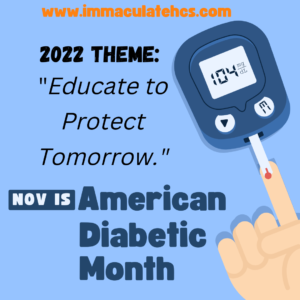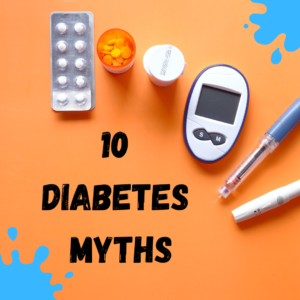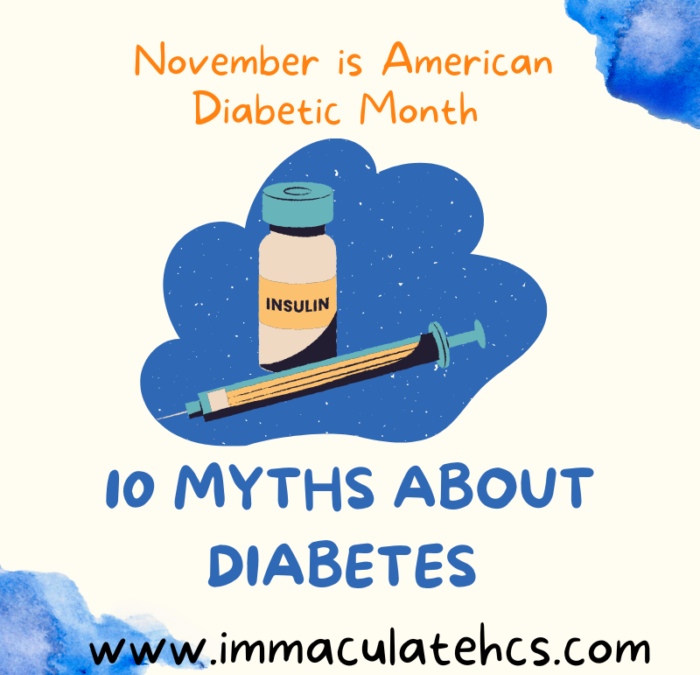What are some of the common diabetes myths you have heard or personally believe or believed in? Sharing these 10 Diabetes Myths will provide you with the necessary information to rule out misconceptions about diabetes.
An estimated 37.3 million Americans have diabetes, this is about 1 in 10 Americans. Diabetes is a complicated disease and even in this information age, people have misconceptions about this long-term chronic disease. Such misconceptions have become a significant hurdle for the proper control and treatment of diabetes.

Educate to Protect Tomorrow
November is American Diabetic Month and the theme this year is Educate to Protect Tomorrow. Unless we educate ourselves on diabetes, our current and future generations are at risk of diabetes as misinformation will lead to the lack of awareness on the causes, treatment, and management of diabetes.
Our article today will inform you about the existing myths about diabetes to help you make better healthcare decisions and effectively support friends or family living with diabetes.
Related Article: Diabetes Management for Seniors at Home
Diabetes Myth 1: Diabetes is Not Genetic
Family lineage and history strongly associate with Type 2 diabetes more than Type 1, thus genes increase the risk of developing diabetes. However, the majority of people with diabetes do not have close family members who also have diabetes. Although genetics contribute to the risk of diabetes, other factors, such as lifestyle choices, also play a role. In families with similar exercise and eating habits, obesity tends to prevail, thus increasing the family’s risk of diabetes. Therefore, individuals can reduce their risk for diabetes by maintaining a healthy weight through a balanced diet and regular exercise.
Diabetes Myth 2: Only Adults Get Diabetes
Unfortunately, diabetes can occur and be diagnosed at any age, meaning children, adolescents or young adults are also at risk of getting diabetes. Although the prevalence in American seniors aged 65 and above remains high, it is estimated that about 283,000 Americans under 20 years have been diagnosed with diabetes. Age is considered one of the major risk factors for diabetes as one can get it at any age. The CDC also reports that race is a risk factor for African Americans, Hispanics, American Indians, and Alaska natives.

Eating Sugar Causes Diabetes
Diabetes Myth 3: Eating Sugar Causes Diabetes
There is no research showing that sugar causes diabetes, however, it is essential to cut back or moderate sweets and sugary treats or beverages. The misconception about sugar causing diabetes is often because ingested sugars are converted into glucose. This is a blood sugar providing energy for the body by having insulin move glucose from the blood into the cell for energy. For diabetics, the body does not make enough insulin or does not use the insulin well. Though sweet foods may not cause diabetes, they can lead to obesity which increases the risk of developing diabetes.
Diabetes Myth 4: Insulin is Only Prescribed to People with Severe Diabetes
This is a dangerous myth because before scientists understood the importance of controlling blood sugar, doctors delayed prescribing insulin for a long time. Using insulin is beneficial as it helps to regulate glucose levels to a healthy range. Type 1 diabetes patients cannot produce insulin due to an immune disorder affecting the pancreas, thus requiring insulin to manage their blood glucose levels. For most type 2 diabetes patients, the disease progresses gradually, and they can maintain healthy blood glucose levels through physical activity, healthy diets, and oral medications. However, some patients need both insulin injections and oral medication to sustain healthy blood glucose levels.
Diabetes Myth 5: Diabetes is Not A Serious Disease
More people die from diabetes-related issues than from breast cancer and AIDS combined. This fact is often underappreciated because diabetes is not a visible disease and lacks the acute trauma associated with most cancers. Estimates indicate that 8.5 million people aged 18 or older are unaware they have diabetes; for most individuals, clinical symptoms indicate serious trouble. It’s crucial to undergo annual laboratory tests to determine whether you have the disease or are prediabetic.

Diabetes is Contagious
Diabetes Myth 6: Diabetes is Contagious
Diabetes is not a virus as pathogens do not cause diabetes, so it cannot be passed from one person to another. It is however important to know the risk factors for diabetes to prevent it from developing at any stage of your life.
Related Article: Importance of Home Care for Seniors with Diabetes
Diabetes Myth 7: There is A Cure for Diabetes
Currently, no pill, injection, or procedure in the medical world can cure diabetes. Some individuals have resorted to using herbs that claim to cure diabetes, but these herbs tend to cause potential harm by interacting with diabetes medication and increasing hypoglycemic effects, which may reduce blood sugars to dangerously low levels and raise the risk of other diabetes-related complications. It’s important to note that individuals with prediabetes and type 2 diabetes can reverse the condition through diet, exercise, and oral medication. However, individuals with prediabetes must be cautious, as they are at risk of developing diabetes more easily.

Diabetic People Should Not Eat Sugar and Carbohydrates
Diabetes Myth 8: Diabetic People Should Not Eat Sugar and Carbohydrates
Diabetics need a balanced diet with limited sugars, focusing on non-starchy vegetables, whole grains, and whole foods. While sugars and carbs can affect blood glucose levels, they are found in nutritious foods like fruits and veggies. Managing consistent carbohydrate intake helps stabilize blood sugar. If unsure, it’s advisable to consult a nutritionist for dietary guidance and involve a home care agency to professionally plan and prepare your food.
Diabetes Myth 9: Diabetes Always Leads to Amputation and Blindness
If individuals manage diabetes carefully and effectively, occurrences of amputation and blindness are very rare. However, some cases of diabetes have led to long-term blood vessel damage, resulting in complications such as amputation, kidney failure, heart disease, blindness, nerve damage, foot ulcers, and even strokes. Proper management of diabetes can prevent these complications. Diabetic patients should undergo regular screenings for their feet, eyes, and kidneys to monitor these conditions.

10 Diabetes Myths
Diabetes Myth 10: People with Diabetes are More Susceptible to Other Diseases
People with diabetes are not more likely to acquire other diseases. However, healthcare providers recommend that individuals with diabetes receive the appropriate vaccines or shots to prevent further complications. This is necessary because any additional illness affecting the body can complicate the management of diabetes. However, individuals with diabetes are more likely to experience severe complications from other diseases compared to those without diabetes.
We aim to provide you with information that enhances your understanding of diabetes and empowers you to take preventive, treatment, or management measures. Get educated to protect tomorrow!
Did you know that Immaculate Homecare Services Diabetes Management Program is designed to help you with the following in the comfort of your home?
- Administering and monitoring oral medication and insulin.
Engaging in lifestyle management through meal planning and preparation (with the option to involve your physician or nutritionist).
Monitoring blood glucose levels and blood pressure regularly.
Controlling weight and stress with a companion for shared projects, gardening activities, conversations, and other stimulating activities to provide necessary social contact for lonely individuals.
Ensuring attendance at preventative screenings.
Managing comorbidities for patients with additional illnesses apart from diabetes…and more.
Our plans customize to meet your individual needs, enabling you to lead a fulfilling life and maintain the highest level of independence in your daily activities.
Book A Free Consultation and Home Assessment
Like and follow us on Facebook, Instagram, Twitter & LinkedIn.
Subscribe to our YouTube Channel



